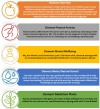Health promotion in German kindergartens-design and methods of the exploratory, cluster-randomized, mixed methods KNEIPP-KITA Bavaria study
- PMID: 40510854
- PMCID: PMC12160532
- DOI: 10.3389/fmed.2025.1585322
Health promotion in German kindergartens-design and methods of the exploratory, cluster-randomized, mixed methods KNEIPP-KITA Bavaria study
Abstract
Background: The Kneipp Health Concept, which can be traced back to the German Sebastian Kneipp, integrates five health-promoting elements: physical activity, healthy nutrition, medicinal herbs, mental wellbeing and hydrotherapy. This concept is embedded in a pedagogical framework for children and has been adopted by more than 500 kindergartens across Germany and in other countries. The KNEIPP-KITA study Bavaria aims to evaluate the short- and medium-term effects of KHC on the health and wellbeing of children, their parents, and educational staff.
Methods: This explorative, cluster-randomized, matched-pair, two-arm controlled, mixed-methods study is being conducted in 10 kindergartens, which are randomly assigned to either the Kneipp group (implementing the Kneipp Health Concept as intervention) or a control group. Children aged 3 years and older, their parents, and kindergarten staff are included in the study, with a follow-up period of 24 months. Staff in the Kneipp group receive a specific training in the five elements of Kneipp Health Concept, after which they integrate these components into daily routine of their kindergarten. The control group continues their usual activities without implementing the Kneipp Health Concept. Outcome parameters (assessed through questionnaires in children, parents and staff) include health status, health consciousness, health-related behavior, family health, and quality of life at 9, 15, and 21 months after the Kneipp Health Concept training (start of intervention). In addition, barriers and facilitators of the implementation are explored in a qualitative sub-study through semi-structured interviews conducted with kindergarten staff and parents in the Kneipp group at baseline and 14-16 months post-training. Data analyses will be carried out at both the individual and cluster level, with separate analyses for children, parents, and staff. The qualitative data will be analyzed using the Framework Method following the approach outlined by Gale et al.
Discussion: The results of the study pave the way for a sustainable implementation of the Kneipp Health Concept. In addition, this exploratory study will inform the planning of future intervention studies with valuable data material and contribute to the development and evaluation of effective childhood prevention strategies.
Trial registration: Deutsches Register Klinischer Studien DRKS (German clinical trials register) ID: DRKS00031865.
Keywords: Kneipp Health Concept; health prevention; health promotion; hydrotherapy; kindergarten.
Copyright © 2025 Ortiz, Bernardi, Welker, Boyer, von Sommoggy, Baurecht, Roll, Tissen-Diabaté, Herrmann and Brinkhaus.
Conflict of interest statement
The professorship of BB and his research group was partly funded by the Kneipp Association. The remaining authors declare that the research was conducted in the absence of any commercial or financial relationships that could be construed as a potential conflict of interest.
Figures
Similar articles
-
Effect of the health and wellness Kneipp concept on health promotion and reduction of sick days for kindergarten children: a cluster randomized controlled trial protocol.Front Med (Lausanne). 2024 Jul 26;11:1412971. doi: 10.3389/fmed.2024.1412971. eCollection 2024. Front Med (Lausanne). 2024. PMID: 39131084 Free PMC article.
-
The Effect of Cold-Water Hydrotherapy According to Sebastian Kneipp for Immune Stimulation: A Nonrandomized, Controlled, Explorative, Mixed-Methods Clinical Study.J Integr Complement Med. 2022 Sep;28(9):749-756. doi: 10.1089/jicm.2022.0476. Epub 2022 Jun 1. J Integr Complement Med. 2022. PMID: 35649190 Clinical Trial.
-
Folic acid supplementation and malaria susceptibility and severity among people taking antifolate antimalarial drugs in endemic areas.Cochrane Database Syst Rev. 2022 Feb 1;2(2022):CD014217. doi: 10.1002/14651858.CD014217. Cochrane Database Syst Rev. 2022. PMID: 36321557 Free PMC article.
-
Effectiveness and cost-effectiveness of four different strategies for SARS-CoV-2 surveillance in the general population (CoV-Surv Study): a structured summary of a study protocol for a cluster-randomised, two-factorial controlled trial.Trials. 2021 Jan 8;22(1):39. doi: 10.1186/s13063-020-04982-z. Trials. 2021. PMID: 33419461 Free PMC article.
-
[Effekte der Kneipp-Therapie: Ein systematischer Review der aktuellen wissenschaftlichen Erkenntnisse (2000-2019)].Complement Med Res. 2021;28(2):146-159. doi: 10.1159/000510452. Epub 2020 Oct 13. Complement Med Res. 2021. PMID: 33049739 German.
References
LinkOut - more resources
Full Text Sources



